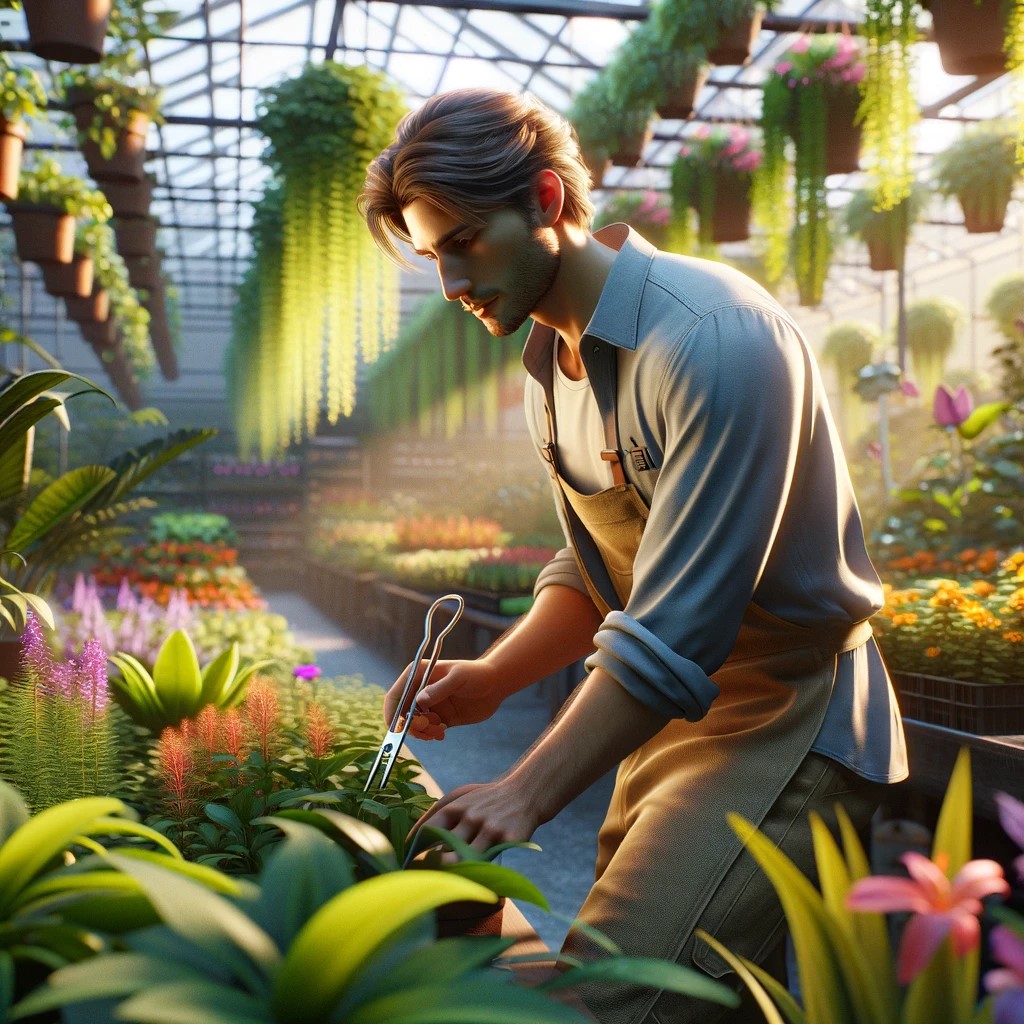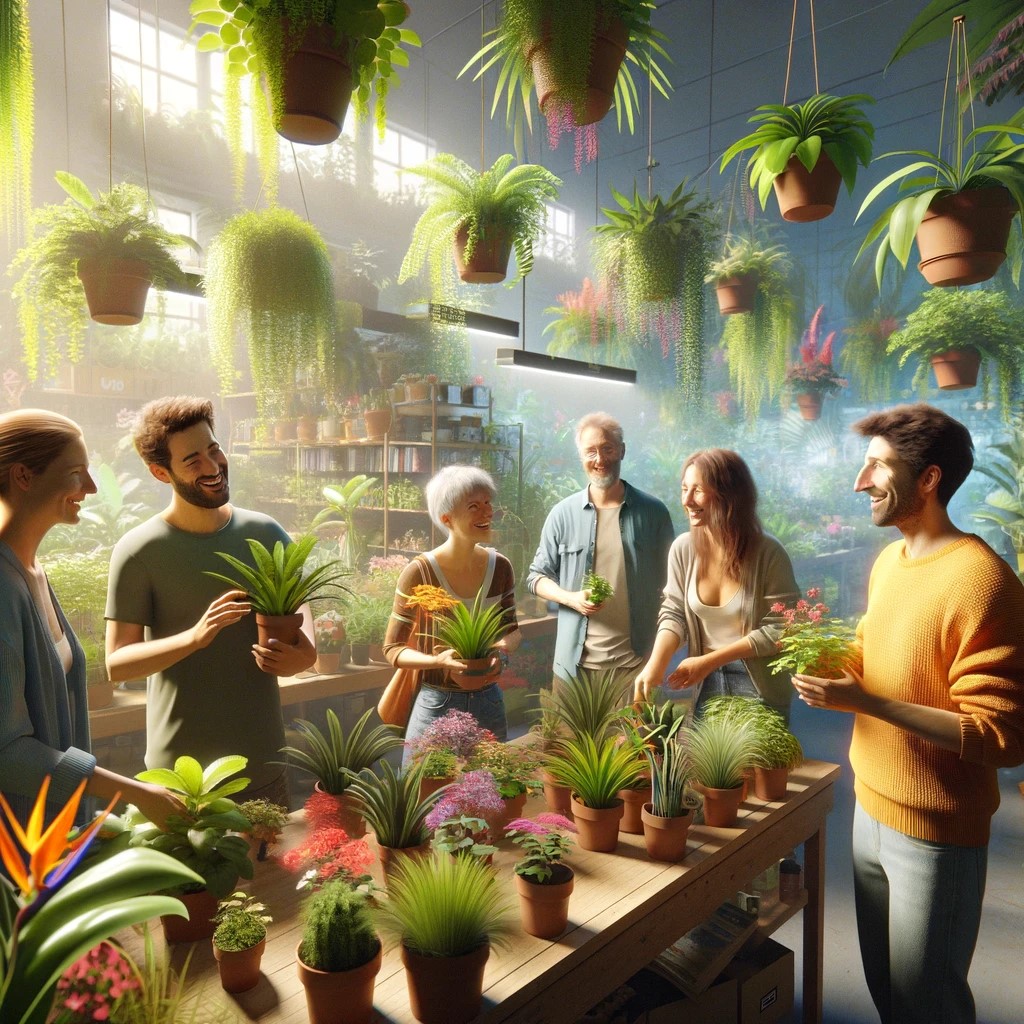Discovering Your Green Thumb: A Guide to London’s Horticultural Scene
London, a city renowned for its rich history and vibrant culture, also offers a unique canvas for botanical studies and horticulture. The city’s distinct seasons, expansive green spaces, and commitment to conservation make it a fertile ground for plant enthusiasts to cultivate their passion.
London’s diversity in plant life and garden design is unparalleled. From the historic Royal Botanic Gardens, Kew, to the hidden green havens in urban nooks, the city provides a broad spectrum of flora from around the world, making it a living laboratory for botanical studies.
Whether you’re just starting out or you’re a seasoned gardener, London’s horticultural scene offers endless opportunities for learning and growth. Workshops and courses range from beginner gardening to advanced botanical studies, ensuring that there’s something for everyone.
Fostering a Community of Plant Enthusiasts
Public gardens and workshops play a crucial role in building a community around a shared love for plants. They offer a space for exchange, inspiration, and support, further enriching London’s horticultural landscape.
This article aims to be your compass in navigating London’s horticultural offerings, helping you to deepen your understanding and appreciation of botany and gardening. Through exploring public gardens, participating in workshops, and connecting with fellow enthusiasts, you’re well on your way to discovering your green thumb in this vibrant city.
Exploring London’s Premier Botanical Gardens
Venturing into London’s botanical gardens is a journey through living museums of plant biodiversity and conservation. These gardens are not just scenic retreats but pivotal centres for botanical research, education, and a showcase of unique flora.
Top Gardens for Plant Aficionados
The Royal Botanic Gardens, Kew, and The Chelsea Physic Garden emerge as must-visits. Kew is celebrated for its vast collection of plants from across the globe, while Chelsea, known as London’s oldest botanical garden, offers an intimate glimpse into the world of medicinal plants.
Educational and Research Contributions
These gardens are at the forefront of botanical science, contributing significantly to our understanding of plant biology, conservation, and sustainability. They offer educational programs that engage and inspire visitors of all ages, fostering a deeper appreciation for plant diversity and ecological importance.
Seasonal Spectacles and Unique Species
With every season, these gardens undergo a transformation, presenting a dynamic display of nature’s cycles. Spring’s vibrant blooms, summer’s lush greenery, autumn’s fiery hues, and winter’s serene beauty offer varied experiences with each visit. Rare and exotic species found in these gardens, from the ancient Wollemi pine in Kew to the historic Ginkgo biloba in Chelsea, provide a unique window into the plant kingdom.
London’s botanical gardens are essential for anyone keen on deepening their horticultural knowledge or simply seeking solace in nature’s splendour. They embody the city’s commitment to preserving plant heritage and fostering a connection with the natural world.
Participating in Horticulture Workshops and Courses
London’s horticultural scene is ripe with opportunities for both budding and seasoned gardeners to enhance their skills and connect with like-minded individuals. Workshops and courses across the city cater to all levels, offering hands-on experiences that bridge theoretical knowledge with practical gardening prowess.
A Spectrum of Learning Opportunities
From beginner-friendly introductions to gardening to advanced botanical studies, London’s institutions and community gardens host a variety of workshops and courses. These sessions cover everything from basic plant care and landscape design to specialised topics like permaculture, organic gardening, and plant pathology.
Enhancing Practical Gardening Skills
These educational opportunities are designed to enhance practical gardening skills, blending classroom learning with real-world application. Participants get their hands dirty, applying what they’ve learned in a practical setting, which solidifies their knowledge and boosts their confidence in managing their own gardens.
Focus on Sustainability
A significant number of workshops emphasise sustainable and organic gardening practices, reflecting London’s growing commitment to environmental stewardship. These sessions not only teach participants how to garden more sustainably but also why these practices are crucial for the health of our planet.
Connecting with the Horticultural Community
By joining these workshops, you’re not just learning new skills; you’re also becoming part of London’s vibrant horticultural community. These gatherings serve as networking hubs where enthusiasts share tips, exchange ideas, and foster connections that enrich their gardening journey.
Through participation, you’ll discover that London’s horticultural workshops and courses are more than educational opportunities—they’re gateways to a thriving community dedicated to celebrating and conserving the beauty of the plant world.
The Science Behind Plant Care: From Theory to Practice
Diving into the world of horticulture reveals a fascinating blend of art and science, especially when it comes to plant care. Understanding the fundamental botanical principles is key to nurturing healthy gardens. London’s horticultural workshops and courses stand at the forefront of translating these scientific concepts into practical gardening techniques.
Essential Botanical Principles
At the heart of successful plant care are principles such as photosynthesis, soil science, plant physiology, and water management. Knowing how plants interact with their environment allows you to create optimal conditions for their growth.
Applying Science to Gardening
Workshops and courses in London often focus on how enthusiasts can apply scientific concepts to enhance their gardening. Topics range from the importance of soil pH to the role of pollinators in plant reproduction. This knowledge equips gardeners to tackle challenges with confidence and creativity.
Overcoming Common Challenges
Pest management, disease prevention, and climate considerations are among the common challenges addressed in these educational settings. Through hands-on learning, you’ll discover effective, sustainable strategies for maintaining plant health.
Integrating Latest Research
London’s botanical and horticultural courses are continually updated with the latest research, ensuring participants receive the most current insights into plant care. This approach not only enriches the learning experience but also fosters a deeper appreciation for the complexities and wonders of the plant world.
By bridging the gap between theory and practice, these workshops and courses empower you with the knowledge and skills to thrive in your gardening endeavours, illustrating the dynamic and evolving nature of horticulture.
Urban Gardening: Cultivating Green Spaces in London
In the heart of London, urban gardening is flourishing as an innovative solution to the challenge of creating green spaces in densely populated areas. This movement not only beautifies the city but also plays a crucial role in enhancing biodiversity and fostering community ties.
Innovative Urban Gardening Solutions
Londoners are turning rooftops, balconies, and even windowsills into vibrant green spaces. Vertical gardens and container gardening have become popular ways to grow plants and vegetables in limited spaces, showcasing creativity and resilience in urban horticulture.
Contributions to Biodiversity and Ecological Health
Urban gardens are oases in the concrete jungle, contributing significantly to the city’s biodiversity. They provide essential habitats for pollinators and other wildlife, helping to maintain ecological balance and improve air quality.
Resources for Aspiring Urban Gardeners
Resources abound for those looking to start their own urban garden. From local horticultural societies offering advice and workshops to community programs providing seeds and planting materials, support is readily available. Online platforms and social media groups also offer a wealth of information and inspiration.
Community Gardens: A Hub for Connection
Community gardens play a pivotal role in fostering a sense of belonging and connectivity among urban dwellers. These shared spaces not only allow for collaborative gardening efforts but also serve as venues for social events and educational workshops, strengthening community bonds.
Urban gardening in London exemplifies how cities can transform underutilised spaces into lush, green sanctuaries that benefit both the environment and the community, proving that even in the busiest of urban settings, nature can thrive and flourish.
The Role of Technology in Modern Horticulture
The fusion of technology and horticulture is revolutionising the way we approach gardening and plant care, making it more efficient, accessible, and innovative. In London, the integration of technological advancements into the horticultural field is evident, from the ways we cultivate plants to how we learn about them.
Enhancing Gardening Practices with Technology
Technology is being leveraged to enhance gardening practices through smart irrigation systems that conserve water, soil sensors that monitor moisture and nutrient levels, and climate-controlled greenhouses that allow year-round cultivation. These innovations ensure optimal plant growth while minimising environmental impact.
Tech-Driven Tools and Apps
For the tech-savvy gardener, a plethora of gardening tools and apps are available at their fingertips. Apps for plant identification, garden planning, and pest management offer valuable assistance, making gardening more accessible to novices and providing seasoned gardeners with new insights.
Incorporation in Botanical Gardens and Institutions
London’s botanical gardens and research institutions are incorporating technology in their exhibits and research. Interactive displays, virtual tours, and digital archives offer immersive educational experiences, while advanced research technologies facilitate groundbreaking studies in plant science.
Future Technological Advancements
The future of horticulture looks promising with potential advancements such as robotic gardeners, AI-driven plant care advice, and genetic engineering to develop more resilient plant varieties. These innovations could further transform gardening, making it more efficient, sustainable, and fascinating.
As we embrace the digital age, technology continues to shape the landscape of horticulture, offering exciting possibilities for enhancing our interaction with the natural world.
Conservation and Biodiversity: London’s Contribution
London’s green spaces, gardens, and workshops are at the forefront of efforts to promote plant conservation and enhance biodiversity. These initiatives not only contribute to the preservation of unique and endangered species but also support global biodiversity goals, engaging the community in meaningful conservation work.
Initiatives Promoting Plant Conservation
London’s gardens and conservation organisations are implementing a variety of initiatives such as seed banking, habitat restoration projects, and educational programmes focused on the importance of plant conservation. These efforts aim to safeguard plant diversity for future generations.
Supporting Global Biodiversity Goals
By preserving rare and endangered species, these initiatives directly contribute to global biodiversity conservation goals. They serve as living laboratories for scientific research and as educational resources that highlight the interconnectedness of ecosystems worldwide.
The Role of Citizens and Enthusiasts
Citizens and horticulture enthusiasts play a vital role in conservation efforts. Through volunteering, participating in workshops, and adopting sustainable gardening practices, individuals contribute to the health of London’s biodiversity and the wider global ecosystem.
Protecting Endangered Species
Efforts to protect endangered plant species in London include specialised breeding programmes, creating microhabitats within gardens, and reintroducing species to their natural habitats. These actions ensure the survival of plant species at risk of extinction, maintain ecological balance, and support biodiversity.
In embracing these conservation practices, London sets an exemplary model of how urban environments can contribute significantly to the preservation of biodiversity and the protection of endangered species, fostering a greener, more sustainable future.
The Healing Power of Plants: Therapeutic Horticulture
Therapeutic horticulture has blossomed in London, showcasing the profound impact of plant interaction on our mental and physical well-being. This approach integrates gardening and plant-based activities into wellness and therapy programs, offering a natural remedy to the stresses of urban life.
Understanding Therapeutic Horticulture
Therapeutic horticulture is the purposeful use of plants and gardening activities to promote health and well-being. It benefits individuals by reducing stress, improving mood, and enhancing physical fitness, thereby fostering healthier communities.
Wellness and Therapy Programs in London
London’s gardens and workshops are increasingly incorporating wellness and therapy programs. Places like the Chelsea Physic Garden and community gardens across the city offer workshops focusing on mindfulness, gardening for mental health, and the therapeutic benefits of being in nature.
Research-Backed Benefits
A growing body of research supports the benefits of engaging with plants. Studies have shown that horticultural therapy can decrease depression, improve attention, lower stress, and even reduce the need for medication in some individuals.
Getting Involved
For those interested in experiencing the healing power of plants, London offers numerous opportunities. Whether through volunteer work in community gardens, participating in workshops, or simply spending time in one of the city’s many green spaces, engaging with the therapeutic aspects of horticulture is accessible to everyone.
By exploring the intersection of horticulture and health, Londoners and visitors alike can discover the restorative and rejuvenating effects of plants, further enriching their connection to the natural world.
Building a Community of Plant Lovers: Events, Societies, and Online Forums
London’s vibrant horticultural scene is enriched by a thriving community of plant lovers, where events, societies, and online platforms play a pivotal role in bringing enthusiasts together. These communities offer a fertile ground for learning, sharing, and collaboration, fostering a deeper connection with the world of plants.
Events and Societies Uniting Horticulture Enthusiasts
Garden tours, plant swaps, and horticultural shows are just a few of the events that draw London’s gardening community together. Societies such as the Royal Horticultural Society and local gardening clubs offer regular meetings, talks, and workshops, creating opportunities for members to learn from experts and each other.
Support and Collaboration Among Members
These groups and events provide invaluable support for both novice and experienced gardeners, offering advice, inspiration, and the chance to collaborate on community gardening projects. The sense of camaraderie and mutual support is a cornerstone of these communities.
The Role of Online Forums and Social Media
Online forums and social media platforms such as Instagram and gardening blogs have become popular among London’s gardening community, allowing for the sharing of tips, successes, and challenges. Websites like Gardeners’ World and the RHS forum are bustling with activity, offering a space for questions, discussions, and the exchange of ideas.
Enriching the Horticultural Experience
Through participation in these events, societies, and online communities, gardeners enrich their horticultural journey with shared knowledge and experiences. The sense of belonging to a community of like-minded individuals enhances the joy of gardening, making it a more rewarding and fulfilling pursuit.
In fostering these connections, London continues to cultivate a thriving and inclusive environment for anyone passionate about plants, gardening, and the great outdoors.
Reflections and Next Steps: Growing Your Horticultural Journey
Embarking on a journey through London’s rich tapestry of botanical studies and horticulture workshops offers a unique blend of education, community, and personal growth. As we reflect on the pathways to deepen our engagement with the plant world, several key insights and forward-looking thoughts emerge.
Key Takeaways for Aspiring Horticulturists
The journey into horticulture in London reveals the importance of continuous learning and community involvement. Exploring the city’s gardens, participating in workshops, and connecting with fellow enthusiasts are fundamental steps towards cultivating a deeper understanding and appreciation for plants.
Continuing Exploration and Contribution
To further enrich your horticultural journey, consider volunteering at local gardens, joining societies, or even starting your own urban gardening project. Engaging with online forums and social media groups dedicated to gardening in London can also expand your knowledge and network.
Anticipating Future Trends
The future of London’s botanical and horticultural landscape is likely to see an increased focus on sustainability, biodiversity conservation, and the integration of technology in gardening practices. Staying informed about these trends will offer exciting opportunities for innovation and contribution.
The Enriching Power of Plants
Ultimately, engaging with plants and nature offers profound benefits for our mental, physical, and spiritual well-being. It connects us to the cycles of life, fosters mindfulness, and contributes to a more sustainable and compassionate world.
As you continue to grow your horticultural journey, remember that every plant nurtured, every garden visited, and every community joined adds a leaf to the vast garden of your life, making it ever more vibrant and fulfilling.




